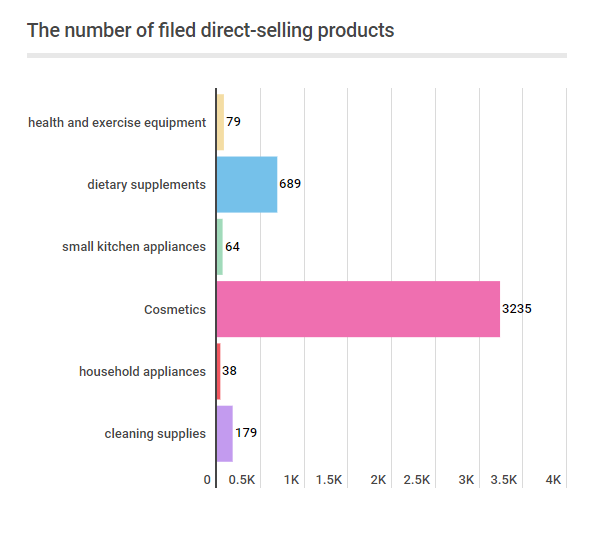On Feb. 14, China's MOFCOM spokesman Gao Feng, during a scheduled regular media briefing, said that “services pertaining to administrative approval and filing of direct selling have been suspended and a reform and rectification of the sector will be carried out to regulate these businesses”. “China MOFCOM will also improve related laws and regulations and establish a credit-based blacklist system of direct-selling companies and major practitioners”, Gao added.
What is Direct Selling?
Direct selling refers to a retail method in which brand owners/manufacturers directly market products to consumers in any place away from traditional fixed business premises. Unlike traditional retail channels or e-commerce, it emphasizes direct (face to face) interactions between brand owners/manufacturers and consumers. Compared to other retail methods, direct selling is relatively low-cost and convenient as the middle man is removed from the supply chain.
Direct-selling Cosmetics
In China, only 6 types of products specified in MOFCOM’s Notice the Scope of Direct Selling Products [1] are permitted to be retailed using direct selling. The six product categories are cosmetics (the most significant of the 6), cleaning supplies, dietary supplements, health and exercise equipment, small kitchen appliances and household appliances.
According to MOFCOM’s direct selling management platform [2], a total of 4302 products in these 6 categories have been filed, of which 3235 are cosmetics, accounting for 75.20%. The specific data is shown in the following graph:
Direct-selling cosmetic enterprises
With regard to direct-selling enterprises, the Direct Selling Regulations [3] stipulates that only companies which have obtained a Direct Sales License are allowed to engage in business activities.
The procedures for obtaining a license are as follows:
Applicants submit an application to the MOFCOM through provincial competent commercial departments;
Provincial competent commercial departments submit the documents/materials to the MOFCOM within 7 days;
Decisions of approval or disapproval will be made by the MOFCOM after consulting the administrative department for industry and commerce under the State Council, within 90 days after receiving the documents/materials.
Currently, as disclosed on MOFCOM’s direct selling management website, there are 91 accredited direct-selling companies in China, 52 of which sell cosmetics. For those cosmetic enterprises, 24 are foreign-funded enterprises, including well-known direct-selling cosmetic enterprises such as Avon, Mary Kay, Oriflame.
| List of Licensed Cosmetic Enterprises | ||
| Enterprises | Country | Licensed time |
| Avon | USA | 2006.02.22 |
| Oriflame | Switzerland | 2006.09.19 |
| Mary Kay | USA | 2006.12.01 |
| Amore Pacific | Korea | 2011.07.11 |
| POLA | Japan | 2013.10.08 |
Despite the economic significance of this sector of China’s cosmetic market, direct selling has traditionally been viewed as somewhat of an afterthought by policymakers and administrators. Regulatory reform of the sector has lagged behind other trade channels and as such direct selling has become synonymous with lax regulation and is often seen as a means to circumvent China’s stricter requirements and avoid the watchful eyes of China’s market regulators. Unfortunately, this lax regulation has also meant that the direct sales sector is also synonymous with product quality, safety and compliance issues and the predictable and consistent occurrences of high profile safety scandals have made the development of new regulations both necessary and unavoidable.
China MOFCOM’s statements signal what we expect will be the first move in a broader campaign designed to increase the stringency of direct-selling regulations over the coming months. Cosmetic stakeholders engaged in direct selling are advised to ensure all their products are manufactured in line with Chinese national standards.









 We provide full-scale global cosmetic market entry services (including cosmetic registering & filing, regulatory consultation, customized training, market research, branding strategy). Please contact us to discuss how we can help you by
We provide full-scale global cosmetic market entry services (including cosmetic registering & filing, regulatory consultation, customized training, market research, branding strategy). Please contact us to discuss how we can help you by 








